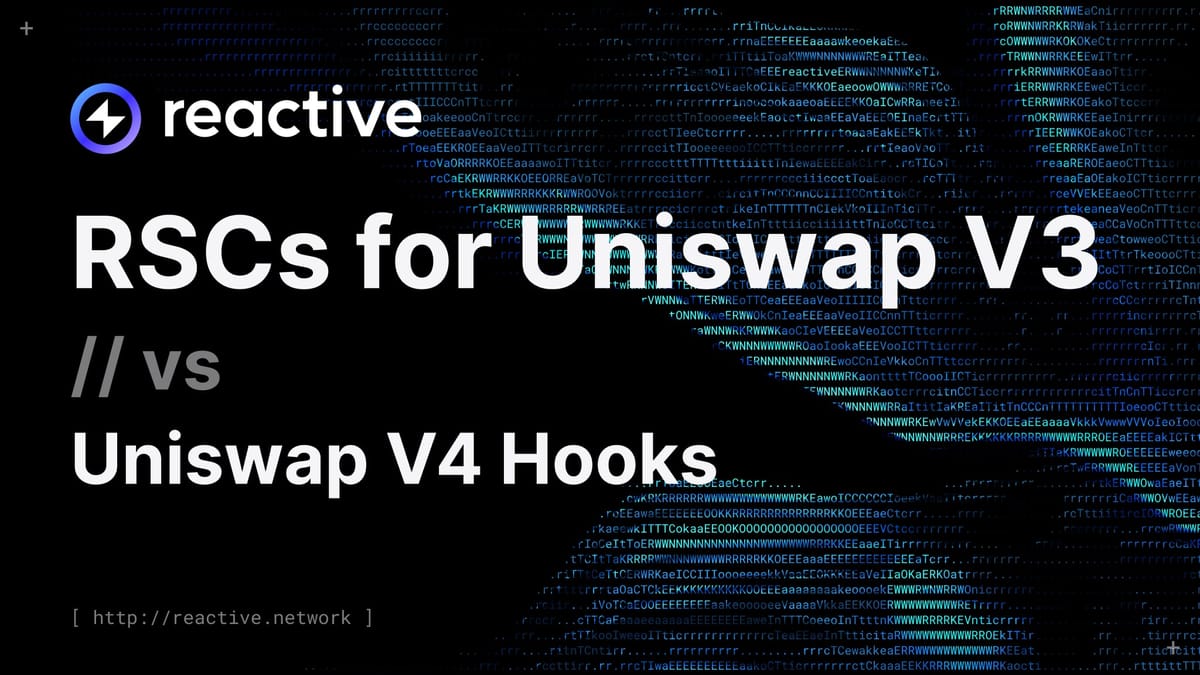Reactive Smart Contracts for Uniswap V3 & Comparative Look at Uniswap V4 Hooks

Uniswap's introduction of hooks in version 4 (V4) marked a significant evolution in the flexibility and capability of DeFi protocols. Hooks in Uniswap V4 enable direct interaction and manipulation of transactions within the protocol itself, offering unprecedented control and customization.
However, for platforms and developers working with Uniswap V3, which lacks native hooks, achieving similar functionality poses a challenge.
This is where Reactive Smart Contracts (RSCs) come into play. Although RSCs do not modify transactions in-flight like V4 hooks, they offer a robust alternative by listening to blockchain events and initiating new transactions based on predefined conditions.
Uniswap V4 Hooks Overview
Uniswap V4 hooks are powerful tools that allow developers to inject custom logic directly into pool transactions, enabling a wide range of operations such as modifying transaction parameters, integrating additional security checks, or even altering the behavior of trades.
These hooks are integrated at various points in the transaction flow, allowing for both pre- and post-transaction customizations.
Reactive Smart Contracts for Uniswap V3
While Uniswap V3 does not support direct transaction manipulation through hooks, RSCs provide a mechanism to build similar features through event-driven architecture. RSCs listen to the stream of blockchain events and react by initiating new transactions.
These contracts are particularly suitable for automating responses to changes in the DeFi environment, such as price movements, liquidity changes, or specific user activities.
Key Similarities and Differences
Event Handling
- Uniswap V4 Hooks: Directly modify ongoing transactions based on real-time data during the transaction process.
- RSCs for V3: Cannot alter existing transactions but can autonomously initiate new transactions in response to detected events. This allows RSCs to perform actions such as rebalancing liquidity or executing trades when certain market conditions are met.
Flexibility and Use Cases
- Uniswap V4 Hooks: Offer granular control over transaction processes, enabling complex strategies and interactions within a single transaction lifecycle.
- RSCs for V3: While offering less direct control over individual transactions, RSCs excel in scenarios where automated, condition-based actions are required. They are ideal for creating automated trading strategies, dynamic fee adjustments, or automated liquidity management systems.
Implementation and Security
- Uniswap V4 Hooks: Require careful consideration regarding security as improper use can lead to vulnerabilities in transaction manipulation.
- RSCs for V3: Focus on the security of triggering conditions and the subsequent transactions they initiate. Since they operate by reacting to events, ensuring the accuracy and timeliness of these reactions is paramount.
While Uniswap V4 hooks offer direct manipulation of transactions, RSCs used with Uniswap V3 provide distinct advantages in certain scenarios. Specifically, RSCs are exceptionally well-suited for use cases where actions do not need to be executed within the same transaction but can instead be based on the outcomes or aggregated events over a period.
1. Scheduled and Conditional Operations: RSCs excel in scenarios requiring scheduled tasks or operations conditional on specific states or cumulative events. For example, they are ideal for executing periodic rebalancing of portfolios, where the timing of the rebalance is not critical to its success but its conditions are.
2. Complex Decision Making: In applications involving complex decision-making algorithms that require data from various sources, RSCs allow for a more extensive analysis before executing transactions. This is particularly useful in scenarios where decisions are based on predictive analytics or require integration with external data feeds (like oracles).
3. Reduced Costs and Risks: Since RSCs operate by initiating transactions in response to events rather than during them, they can help in optimizing gas costs by batching operations or choosing more favorable conditions for transaction execution. This delayed execution also reduces risks associated with high-frequency trading or front-running, as the actions are not visible until executed.
4. Scalability and Maintenance: RSCs contribute to better scalability of applications by decoupling the monitoring and response actions. This separation allows for easier updates and maintenance of the response logic without impacting the core monitoring mechanisms.
5. Enhanced Security: By separating the event monitoring and action phases, RSCs allow each phase to be secured and audited independently, potentially reducing the complexity and increasing the security of smart contracts. This can be especially important in high-value operations where additional safeguards against immediate, automatic reactions are desirable.





